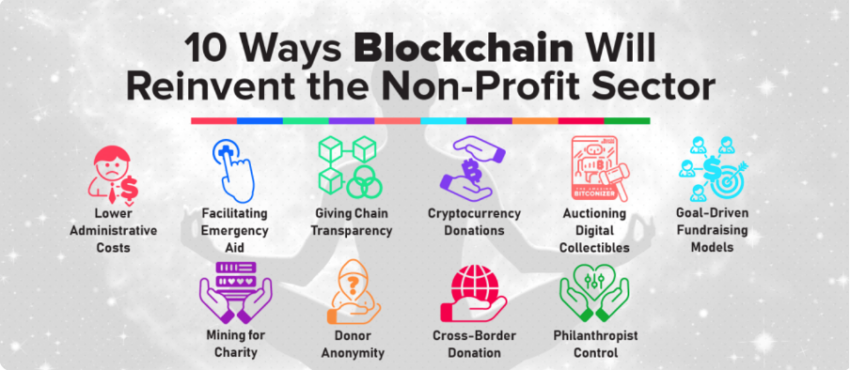How Blockchain Can Help Charities and Nonprofits
Charities and nonprofits are embracing blockchain as a means of demonstrating transparency and accountability. However, some have begun to express concern.
Charities are reporting falling numbers of people donating, although amounts raised remain steady as the wealthy give more. So the question is how to reverse the trend.
The BBB Wise Giving Alliance (Give.org), a standards-based charity evaluator, conducted a survey of 2,000 people. They were asked if they would consider donating to a charity using cryptocurrency. 73% said yes. There are many reasons for this – the most prominent being the tax benefits.
In the United States, the Internal Revenue Service (IRS) considers crypto as stocks or real estate, and a donor can take the full value of the value without paying capital gains tax if they donate directly in cryptocurrency.
If they withdraw the cryptocurrencies, they will lose the money in taxes and thus be able to give less money to charities.
Why the need for blockchain?
Blockchain has shown several uses in the non-profit sector. First, they have been effective financial tools for cross-border payments through remittances and crowdfunding and cut transaction fees in cross-border payments.
Non-governmental organizations (NGOs) are increasingly using blockchain for identity and property rights, especially for refugees who may not have many assets.
They can be given an identity on the blockchain where everything is verifiable, and every single one of the UN agencies or charities has access to that blockchain. They can distribute the individual’s resources to them or track what medical help they need.
Blockchain can also act as an effective medium for donor engagement. Smart contracts can allow donors to track their donations throughout the process. Donors can also participate in voting and decision-making through a system that is easily audible, editable, always transparent and cannot be tampered with.
How Blockchain Can Help the Non-Profit Sector
A Moralis report provides an important idea about how technology can strengthen the non-profit sector.

According to the report, blockchain promotes lower overhead costs as charities have heavy paperwork to compile, record and manage for their Customer Relationship Management (CRM) systems.
Nevertheless, using a decentralized network will eliminate such problems. Other benefits include increased audience confidence and even greater reach.
The report said: “Transparency in not-for-profit organizations is critical to an organisation’s future success. By increasing trust in the charity sector with blockchain, more people are likely to donate.”
Meanwhile, blockchain has the advantage of being available on a global platform, using cutting-edge technology. Blockchain in the charity sector not only increases accountability and transparency in non-profit organizations, but puts them in front of people who are ready to give. This could also see a wider reach among donors worldwide.
The money sent also reaches those who need it faster. From a donor’s perspective, sending money from a wallet is far easier than a traditional bank account.
In addition, transactions are confirmed within minutes. Conversely, a large donation through the old system could take several days and be subject to regulatory checks.
Various crypto institutions have also launched projects to support their philanthropic ambitions. Pink Care Token (PCAT) is the first stablecoin issued for social good on the Binance chain.
The token was introduced as part of the Period Poverty campaign, created in alliance with 47 other businesses and organizations.
Any concerns to consider?
While cryptocurrency and blockchain have several obvious value additions to the nonprofit sector, privacy and security remain significant challenges.
In July 2020, a 17-year-old hacked the Twitter accounts of several public figures such as Barack Obama, Elon Musk and Kanye West. They said they were giving back to their community and that any bitcoin sent to a specific address would be doubled and sent back. Thousands of people fell for the scam, resulting in a loss of tens of thousands of dollars.
On the implementation front, charities need to get up to speed on receiving cryptocurrency donations. This will require having an employee or group of employees familiar with cryptocurrency to take control of the operation.
Next, the steps will be to speed up the process, manage accounts and wallets, and set up protocols for accepting anonymous donations and checking the authenticity of sources.
Disclaimer
All information on our website is published in good faith and for general information purposes only. Any action the reader takes on the information contained on our website is strictly at their own risk.


